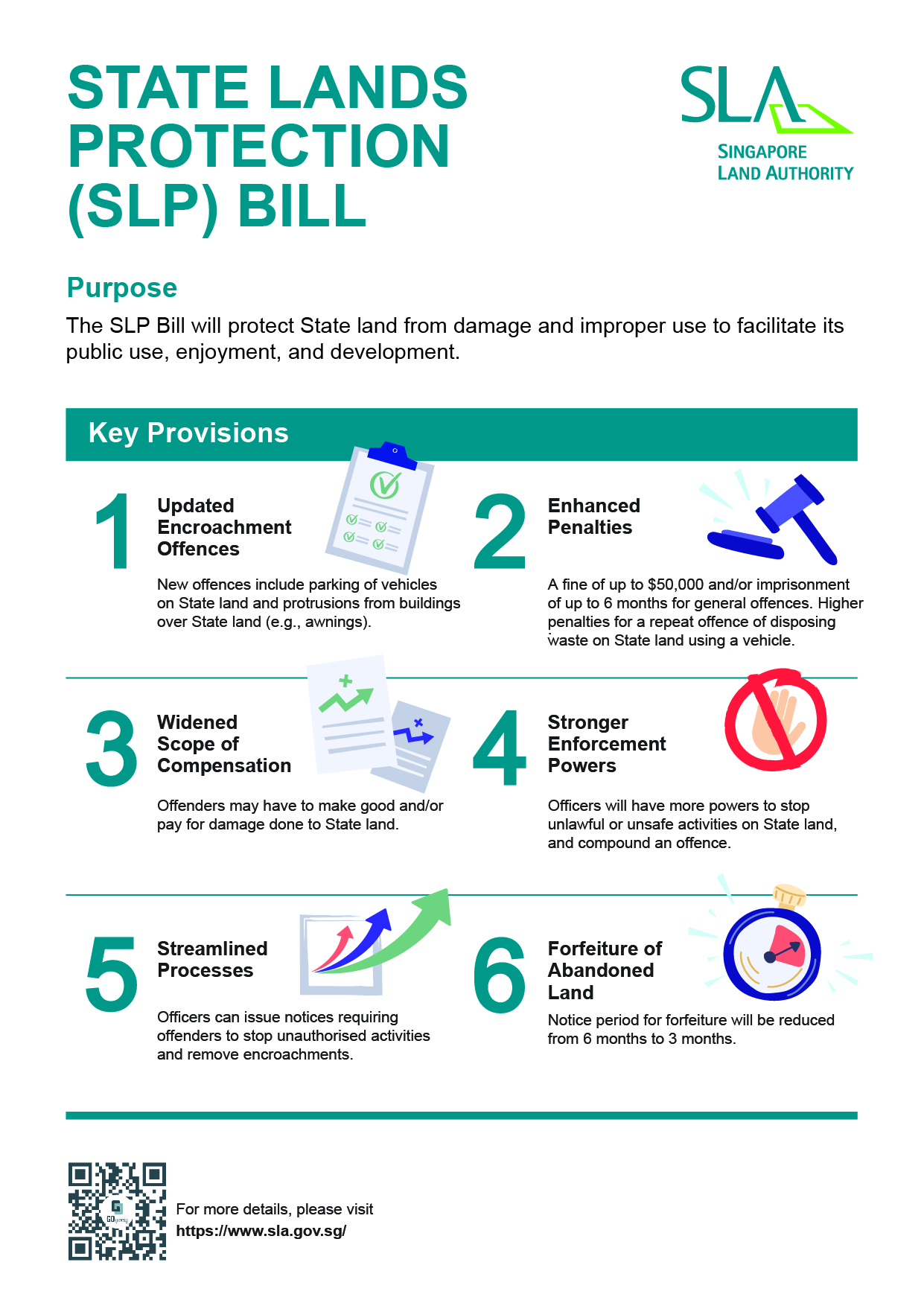New State Lands Protection Bill to replace the State Lands Encroachments Act
Bill provides State land more comprehensive protection from damage and misuse with updated offences, stronger enforcement powers and
wider scope of compensation
1 The Ministry of Law introduced the State Lands Protection Bill (the “Bill”) for First Reading in Parliament today. The new Act will replace the current State Lands Encroachments Act (“SLEA”), which was last reviewed in 1974. Since then, the types of encroachments and misuse of State land have evolved, rendering many of the SLEA’s provisions outdated and ineffective.
2 The enhancements introduced in the Bill will support SLA in their management of State land and ensure that State land is better protected from damage and improper use that can impede development, create public safety issues, and affect public enjoyment of our scarce land resources.
Key Provisions of the Bill
3 The key provisions of the Bill are:
a. Updated definitions and encroachment offences: The Bill clarifies the definition of a “structure” which, when erected on, under or over State land, may constitute an encroachment. This includes land reclamation works and external features protruding from buildings such as awnings. New offences such as parking of vehicles on State land without lawful authority have also been added.
b. Enhanced penalties: Penalties in the new Bill have been raised to align with comparable penalties in newer legislation such as the Parks and Trees Act (“PTA”) which deals with State land that are nature reserves and national parks. The Bill prescribes a penalty comprising a fine of up to $50,000 or imprisonment for a term of up to 6 months, or both, for offences under the Bill. Higher penalties may be imposed for a repeat offence of disposing waste on State land using a vehicle.
c. Widened scope of compensation: The Bill provides that offenders who are convicted may be ordered by the court to make monetary compensation for more types of loss or damage suffered by the Government due to the offence e.g. the value of any substance removed from State land, the costs and expenses incurred by SLA in abating the encroachment, and the costs and expenses incurred by an electricity licensee, a gas licensee or the PUB in complying with a court order to discontinue the supply of electricity, gas or water.
d. Strengthened enforcement powers: Officers will have powers to obtain disclosure of identity from suspected offenders, enter, and inspect any land without warrant if there is reasonable suspicion that the land is used in the commission of an offence. Minor offences may be compounded by collecting a composition sum not exceeding $5,000, instead of instituting criminal proceedings.
e. Streamlined proceedings to abate encroachments: Enforcement proceedings will be streamlined to allow enforcement officers to directly issue encroachment notices requiring offenders to stop unlawful activity on State land (e.g. leave the State land, or demolish/remove unlawful structures on the State land), instead of having to apply to court. Additionally, the Bill provides for interim injunctions to be sought from the court against a person before conviction to prevent, alleviate or minimise irreparable damage to State land, including collapse or danger to persons arising from the unlawful use of State land.
f. Forfeiture of abandoned land: Under the present SLEA, land abandoned for 3 years or more is forfeited to the State if no claim is established within six months from the date of a gazette and a notice in the four official languages posted on the land. The Bill reduces the claim period to three months to expedite the process. SLA will still publish the notice in a manner that will secure adequate publicity.
=== End ===
Issued by:
The Singapore Land Authority
7 November 2022

